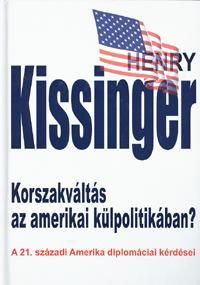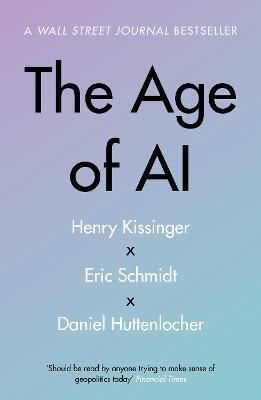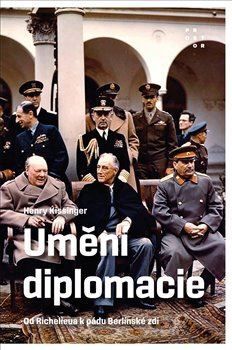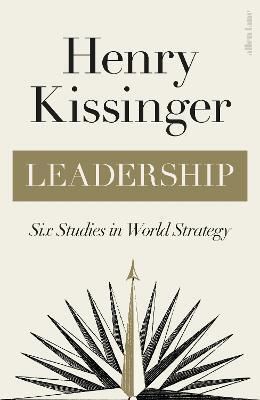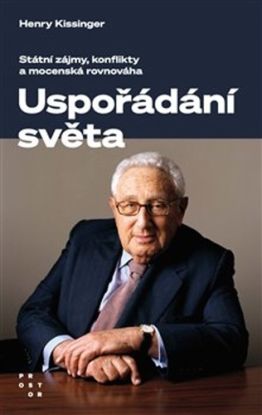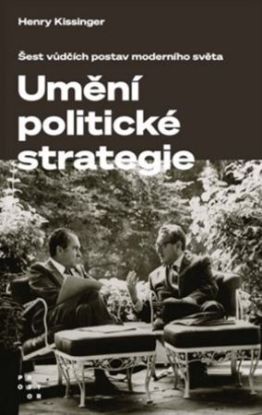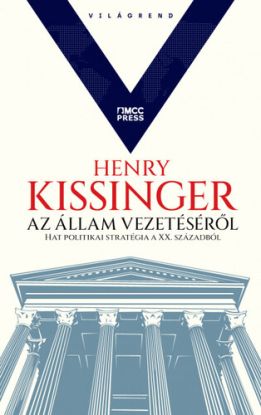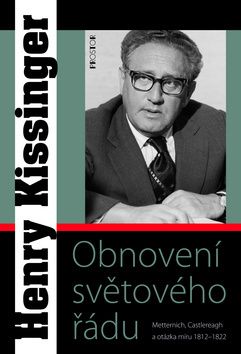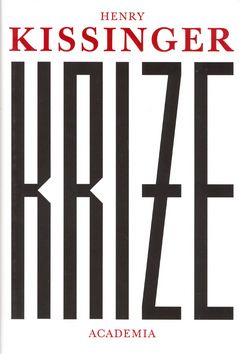Henry Kissinger
autor
Korszakváltás az amerikai külpolitikában?
A könyv hét fejezetében kísérli meg felmérni a huszadik századot meghatározó Egyesült Államok befolyását a huszonegyedik századra, a várható konfliktusok megoldására és egy merészen új világrend kialakítására. A szerző megvizsgálja Amerika mai és jövőbeni lehetséges viszonyát Oroszországhoz, Kínához, Európához, a Közel-Kelethez, Afrikához, Latin-Amerikához és Ázsiához. Külön figyelmet szentel a világ nagy kérdéseinek: a globalizációnak, a nukleáris fegyverek elterjedése megakadályozásának, a szabadkereskedelemnek és bolygónk pusztító természeti környezetének. Henry Kissinger lenyügőző és átfogó viziót vázol fel az elkövetkező évtizedek Amerikájának.
The Age of AI
Three of our most accomplished and deep thinkers come together to explore Artificial Intelligence (AI) and the way it is transforming human society - and what it means for us all. An AI learned to win chess by making moves human grand masters had never conceived. Another AI discovered a new antibiotic by analysing molecular properties human scientists did not understand. Now, AI-powered jets are defeating experienced human pilots in simulated dogfights. AI is coming online in searching, streaming, medicine, education, and many other fields and, in so doing, transforming how humans are experiencing reality. In The Age of AI, three leading thinkers have come together to consider how AI will change our relationships with knowledge, politics, and the societies in which we live. The Age of AI is an essential roadmap to our present and our future, an era unlike any that has come before.
Umění diplomacie, 4. vydání
Zkušený politik-diplomat a historik Henry Kissinger se v jedenatřiceti kapitolách zabývá klíčovými událostmi světových dějin, počínaje dobou kardinála Richelieua přes napoleonské války a velmocenskou rovnováhu devatenáctého století až k dramatům století dvacátého. Zvláště pozoruhodné jsou jeho analýzy současné světové situace, kdy odešel ze scény Sovětský svaz, hlavní protivník Spojených států v období studené války. S důvěrnou obeznámeností dává Kissinger čtenáři nahlédnout do světa nejvyšší – především americké – politiky a líčí i osobní příběhy, které prožil při jednáních se světovými vůdci v roli ministra zahraničí USA.
Zásadní dílo o zahraniční politice a umění diplomacie vychází v češtině již ve čtvrtém vydání.
Leadership: Six Studies in World Strategy
Henry Kissinger analyses how six extraordinary leaders he has known have shaped their countries and the world
'Leaders,' writes Henry Kissinger in this compelling book, 'think and act at the intersection of two axes: the first, between the past and the future; the second between the abiding values and aspirations of those they lead. They must balance what they know, which is necessarily drawn from the past, with what they intuit about the future, which is inherently conjectural and uncertain. It is this intuitive grasp of direction that enables leaders to set objectives and lay down a strategy.'
In Leadership, Kissinger analyses the lives of six extraordinary leaders through the distinctive strategies of statecraft which he believes they embodied. After the Second World War, Konrad Adenauer brought defeated and morally bankrupt Germany back into the community of nations by what Kissinger calls 'the strategy of humility'. Charles de Gaulle set France beside the victorious Allies and renewed its historic grandeur by 'the strategy of will'. During the Cold War, Richard Nixon gave geostrategic advantage to the United States by 'the strategy of equilibrium'. After twenty-five years of conflict, Anwar Sadat brought a vision of peace to the Middle East by a 'strategy of transcendence'. Against the odds, Lee Kwan Yew created a powerhouse city-state, Singapore, by 'the strategy of excellence'. Although when she came to power Britain was known as 'the sick man of Europe', Margaret Thatcher renewed her country's morale and international position by 'the strategy of conviction'.
To each of these studies, Kissinger brings historical perception, public experience and - because he knew each of their subjects, and participated in many of the events he describes - personal knowledge. The book is enriched by insights and judgements such as only he could make, and concludes with his reflections on world order and the indispensability of leadership today.
Uspořádání světa, 3. vydání
Třetí vydání zásadní práce vlivného politologa, historika a bývalého ministra zahraničí Spojených států amerických z roku 2014, ve které autor předkládá mnohostranný, historickými a politickými souvislostmi podložený pohled na řád světa.
Ukazuje, že kořeny současného uspořádání mezinárodních vztahů byly poprvé zformulovány v západní Evropě téměř před čtyřmi staletími na mírové konferenci v německém Vestfálsku. Mír po třicetileté válce tehdy odrážel pragmatické vyrovnání s realitou a byl založen na společenství suverénních států, které kontrolují své vzájemné ambice prostřednictvím všeobecné mocenské rovnováhy. Vestfálský systém se postupně rozšířil po celé zeměkouli a pojal do sebe řadu odlišných civilizací a regionů. Autor sleduje, jakými proměnami prošel tento systém rovnováhy po Francouzské revoluci a napoleonských válkách na vídeňském kongresu a jak se s jeho stavebními kameny vyrovnávaly jiné části světa v souvislosti se svou historickou, politickou a kulturní odlišností. Autor věnuje svůj analytický pohled také otázkám Středního východu (a speciálně Íránu), odlišným koncepcím mocenské rovnováhy v Evropě a Asii, zvláště čínské „harmonii pod nebesy“. Pozornost zaměřuje také na americké politické vize, které se přestaly opírat pouze o systém vyvažování a začaly usilovat o dosažení míru šířením demokratických principů. Kissingerovy úvahy ústí v současnosti a hledají perspektivu světového řádu pro naši dobu tváří v tvář takovým výzvám, jako je islamismus, šíření jaderných zbraní a globalizace.
Umění politické strategie
Světoznámý politolog, historik, poradce pěti amerických prezidentů a laureát Nobelovy ceny míru Henry Kissinger detailně analyzuje kariéru šesti legendárních státníků: Konrada Adenauera, jenž po druhé světové válce přivedl poražené Německo zpět do společenství národů. Charlese de Gaulla, díky němuž se Francie postavila po bok vítězných Spojenců. Richarda Nixona, který vyvedl USA z konfliktu ve Vietnamu a svou konstruktivní zahraniční politiku založil na rovnováze mezi velmocemi. Anvara Sádáta, jenž po čtvrtstoletí konfliktů přinesl na Blízký východ vizi míru. Li Kuang-jaa, který ze Singapuru vytvořil zajištěný, blahobytný a dobře řízený městský stát. A Margaret Thatcherové, jíž se podařilo obnovit hrdost a mezinárodní postavení Velké Británie.
Všichni se zformovali v období, kdy se v Evropě hroutily zavedené instituce, koloniální struktury ustupovaly nezávislým státům v Asii a Africe a ze zbytků starého mezinárodního řádu bylo třeba vytvořit nový. Autor věnuje každé z šesti osobností jeden oddíl, kde podrobně představuje její politický styl i jedinečné charakterové rysy, které se vtiskly do konkrétní vůdcovské strategie. Čtenářům navíc dopřává autentické svědectví, neboť všechny vybrané vůdce, jež považuje za skutečně výjimečné, osobně poznal.
Politické strategie dokazují, že autorova dokonalá paměť a mnohaletá zkušenost představují nepostradatelné zdroje, potřebné pro pochopení moderní světové historie.
Český překlad vychází u příležitosti stých narozenin Henryho Kissingera.
Az állam vezetéséről
"Kevés kortársunkról mondható el, hogy tanúja volt szinte a teljes XX. századnak. Még kevesebbekről, hogy tevékenyen formálták is azt. E kevesek egyike a Nobel-békedíjas Henry Kissinger, az Egyesült Államok legnagyobb hatású nemzetbiztonsági főtanácsadója, Nixon és Ford elnökök külügyminisztere, majd számos későbbi elnök tanácsadója. Szavaira és iránymutatására - legutóbb az ukrajnai háború ügyében - mind a mai napig élénken figyel a nemzetközi közvélemény.
Közelmúltban befejezett könyvében, amely magyarul a szerző 100. születésnapján jelenik meg, az államvezetésről értekezik hat kiemelkedő XX. századi vezető (Konrad Adenauer, Charles de Gaulle, Li Kuang-jao, Richard Nixon, Anvar Szádát és Margaret Thatcher) stratégiáját elemezve. Kissinger nem először veti papírra gondolatait a fenti vezetők némelyikéről, meglátásai mégis meglepően újszerűek. Vajon kié lehetett az alázat, kié az egyensúly, kié a kiválóság és kié az akaraterő stratégiája? És miért fontos, hogy jól válasszuk meg a stratégiánkat?
"Bármely társadalom, függetlenül politikai berendezkedésétől, örökkön egyfajta átmeneti állapotban van az emlékezetét formáló múlt és a fejlődését meghatározó jövőkép között. Ezen az úton elengedhetetlen, hogy e társadalmat vezesse valaki, hiszen [...] vezetés nélkül az intézmények sodródnak, míg a nemzetek a jelentéktelenné válást, legrosszabb esetben pedig a katasztrófát kockáztatják."
Henry Kissinger (1923-) könyvével induló sorozatunk, a Világrend a legfontosabb stratégiai kérdések és az azokra adható válaszok feltérképezésére vállalkozik, hogy elkerülhessük a XXI. század mindnyájunkat fenyegető katasztrófáit. A sorozat további köteteiben is jelentős szerzők változatos nézőpontokból megfogalmazott gondolatait olvashatjuk, amelyek útbaigazítanak minket a folyamatosan átalakuló világrendben. "
Na sklade 1Ks
19,94 €
20,99 €
The Meaning of History
The Meaning of History is the senior thesis written by Henry Kissinger at Harvard university in 1950, when he was twenty-seven. More than 70 years later it is now being published for the first time. The thesis explores the thought of three distinct but important thinkers in the canon of Western philosophical and historical thought, in a way that also reflected Kissinger's own transition from the Continental world to the Atlantic. Oswald Spengler (1880-1936) was a German historian and philosopher; Arnold Toynbee (1889-1975) a British historian and philosopher and Immanuel Kant (1724-1804), a Prussian of the European Enlightenment era and one of the most important moral and political philosophers to emerge from his time.
The study is intimidatingly long and weighty in its own right; at almost four hundred typed pages, it wrestles with some of the first-order dilemmas of Western political, philosophical, and moral thought. Its scope ranges from the Enlightenment through to the midpoint of the twentieth century - an era scourged by two world wars and the advent of the nuclear age. Equally important, it provides great insight into the conceptual perspective of its author, Henry Kissinger, who was to become the most influential American scholar statesman of the post 1945 period.
Az állam vezetéséről
Kevés kortársunkról mondható el, hogy tanúja volt szinte a teljes XX. századnak. Még kevesebbekről, hogy tevékenyen formálták is azt. E kevesek egyike a Nobel-békedíjas Henry Kissinger, az Egyesült Államok legnagyobb hatású nemzetbiztonsági főtanácsadója, Nixon és Ford elnökök külügyminisztere, majd számos későbbi elnök tanácsadója. Szavaira és iránymutatására – legutóbb az ukrajnai háború ügyében – mind a mai napig élénken figyel a nemzetközi közvélemény.
Közelmúltban befejezett könyvében az államvezetésről értekezik, hat kiemelkedő XX. századi vezető (Konrad Adenauer, Charles de Gaulle, Li Kuang-jao, Richard Nixon, Anvar Szádát és Margaret Thatcher) stratégiáját elemezve. Kissinger nem először veti papírra gondolatait a fenti vezetők némelyikéről, meglátásai mégis meglepően újszerűek. Vajon kié lehetett az alázat, kié az egyensúly, kié a kiválóság és kié az akaraterő stratégiája? És miért fontos, hogy jól válasszuk meg a stratégiánkat?
„Bármely társadalom, függetlenül politikai berendezkedésétől, örökkön egyfajta átmeneti állapotban van az emlékezetét formáló múlt és a fejlődését meghatározó jövőkép között. Ezen az úton elengedhetetlen, hogy e társadalmat vezesse valaki, hiszen […] vezetés nélkül az intézmények sodródnak, míg a nemzetek a jelentéktelenné válást, legrosszabb esetben pedig a katasztrófát kockáztatják.”
HENRY KISSINGER (1923–) könyvével induló sorozatunk, a Világrend a legfontosabb stratégiai kérdések és a rájuk adható válaszok feltérképezésére vállalkozik, hogy elkerülhessük a XXI. század mindnyájunkat fenyegető katasztrófáit. A sorozat további köteteiben is jelentős szerzők változatos nézőpontokból megfogalmazott gondolatait olvashatjuk, amelyek útbaigazítanak minket a folyamatosan átalakuló világrendben.
Na stiahnutie
14,69 €
Obnovení světového řádu
Ve své první práci o dějinách mezinárodní politiky z roku 1957 se Kissinger zabývá diplomatickou historií Evropy od Napoleonovy porážky v Rusku přes sérii mezinárodních kongresů v letech 1814-1822 až po protiturecké povstání v Řecku 1822, které definitivn
Vypredané
21,43 €
22,56 €
Krize
Bývalý ministr zahraničních věcí USA a nositel Nobelovy ceny za mír z roku 1973 je autorem více než desítky publikací, a přesto jeho poslední dílo, které nese podtitul Anatomie dvou hlavních krizí zahraniční politiky, se od jeho předchozích prací výrazně liší, jde o zcela originální zpracování dvou klíčových událostí - války na Středním východě v říjnu roku 1973 a závěrečné fáze vietnamské války, tj. stažení amerických jednotek z území Indočíny, jež se odehrálo mezi 27. březnem a 29. dubnem 1975.
Vypredané
18,75 €
19,74 €
Roky obnovy
Dychtivě očekávaný třetí a poslední díl jeho memoárů uzavírá jedno z hlavních děl zabývajících se událostmi nedávných dějin. Jedná se o knihu, jež je důležitým historickým dokumentem i brilantně vyprávěným příběhem téměř shakespearovské intenzity, plným udivujícího vzhledu stejně jako neobvyklé (a často nemilosrdné) otevřenosti a mimořádného smyslu pro historii.
Vypredané
29,83 €
31,40 €
Umění diplomacie
V jedenatřiceti kapitolách se Henry Kissinger z pohledu zkušeného politika-diplomata a historika zabývá klíčovými událostmi světových dějin, počínaje dobou kardinála Richelieua přes napoleonské války a velmocenskou rovnováhu 19. století až k dramatům století dvacátého. Zvláště pozoruhodné jsou jeho analýzy současné světové situace, kdy odešel ze scény Sovětský svaz, hlavní protivník Spojených států v období studené války. S důvěrnou obeznámeností dává autor čtenáři nahlédnout do světa nejvyšší - především americké - politiky.
Vypredané
44,52 €
46,86 €
Bouřlivé roky
V tomto druhém dílu svých pamětí líčí Henry Kissinger bouřlivé roky druhého funkčního období prezidenta Richarda Nixona, které začalo 20. ledna roku 1973. Jeho knize dominují dvě mimořádné události: skandál Watergate a válka na Blízkém východě, jež propukla v říjnu roku 1973.
Vypredané
38,48 €
40,50 €
Roky v Bílém domě
První svazek monumentálních dějin, v nichž Henry Kissinger líčí roky, kdy se pohyboval v nejvyšších politických kruzích v Americe i ve světě. V této knize se doktor Kissinger zabývá obdobím mezi lety 1969–1973, svými prvními čtyřmi roky ve funkci poradce prezidenta Nixona pro otázky národní bezpečnosti – kdy se současně stal jeho nejbližším rádcem v oblasti zahraniční politiky.
Vypredané
42,80 €
45,05 €
